Richard Engel spoke with family members of people being held hostage in Gaza. Some of the families went to the border to shout messages of support to their loved ones nearly 100 days after the Oct. 7 attack.
“Don’t give up, stay resilient, we’re coming to get you soon,” one woman yelled into a microphone.
Arab nations ‘ready’ to work with U.S. on Gaza, but ‘only’ if Israel commits, State Department spokesman says
State Department spokesman Matt Miller joined Andrea Mitchell to discuss Secretary of State Antony Blinken’s trip to the Middle East and what the future could look like in the region.
Miller said they met with leaders in nine countries and secured agreements with Arab partners and Turkey “that they were ready to have those conversations, they were ready to coordinate with the United States, and they were ready to take real steps to improve the lives of the Palestinian people in Gaza and to look at how to rebuild Gaza and establish Palestinian-led governance in Gaza.”
“But they were only willing to do that if they had a partner on the other side in Israel,” he added.
Wounded evacuated after strike in Khan Younis
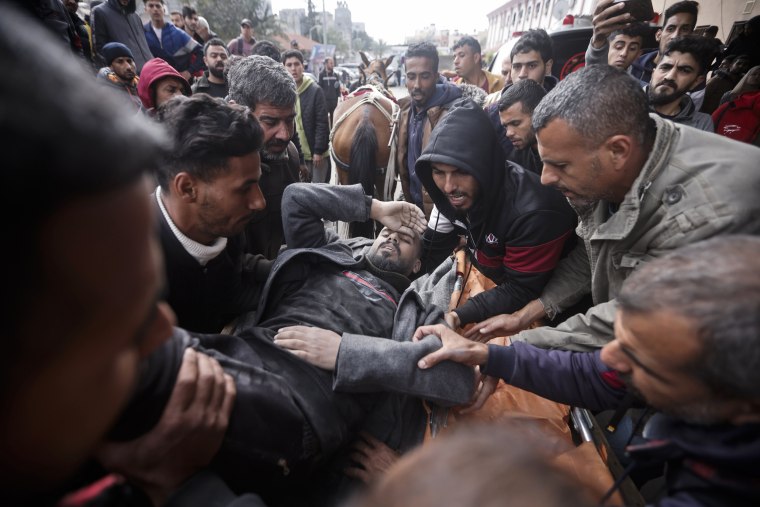
American Israeli soldier returns home to U.S. saying he had ‘no choice’ but to serve
American Israeli soldier Shai Bernstein said on “Top Story with Tom Llamas” that he had “no choice” but to go to Israel and serve after the attacks by Hamas on Oct. 7.
Bernstein, a dual citizen who had already served his time in the Israeli military, was inspired to serve after attending Shabbat services with his family after the terrorist attack.
He spent 40 days of his time serving inside of Gaza and recounted what he saw. Asked if he would return to the Middle East to serve again during this war, Bernstein said, “Yes.”
Missile strike on Houthi radar site was ‘follow-on action’ from earlier strikes, military says
A Tomahawk missile strike against a Houthi rebel radar site inside Yemen early Saturday local time was a “‘follow-on action” from the strikes a day earlier, the U.S. military said.
The new strike was launched at 3:45 a.m. Saturday local time using Tomahawk missiles launched from the USS Carney, U.S. Central Command said in a statement.
It “was a follow-on action on a specific military target associated with strikes taken on Jan. 12 designed to degrade the Houthi’s ability to attack maritime vessels, including commercial vessels,” it said.
Al Jazeera rejects Israel’s ‘terrorist’ claims against slain journalists
Al Jazeera strongly condemned what it called the Israel Defense Forces’ “false and misleading” efforts to justify the killing of its employee Hamza Wael Al-Dahdouh and other journalists during the Israel-Hamas war.
Dahdouh, 27, and his colleague Mustafa Thuraya were killed in a strike on their car in the southern Gazan city of Rafah on Sunday, drawing outrage from press freedom groups and calls for an investigation. The IDF said it had targeted a ‘terrorist’ in the vehicle, an allegation that has not been independently verified by NBC News.
The Qatar-based news network said Dahdouh “was killed simply for doing his job and for shining a light on events that the Israeli army would rather stayed in the dark.”
“Al Jazeera rejects all accusations made against our journalists and calls on the international community to ensure that the IDF is held fully accountable for its crimes,” it said in a statement.
Dahdouh’s father Wael Dahdouh, Al Jazeera’s Gaza bureau chief, had already lost multiple family members in the war, including his wife, two other children and grandson, who were killed in an Israeli airstrike on a refugee camp in October.
According to the Committee to Protect Journalists, 79 journalists and media workers have been killed since the Israel-Hamas war began Oct. 7, including 72 Palestinians, four Israelis and three Lebanese, making it the deadliest conflict for journalists in modern history.
U.S. carries out another strike against Houthi rebels in Yemen
The United States conducted another strike against Houthi rebels in Yemen tonight, according to two U.S. defense officials.
The strike was done by the U.S. and was carried out from a Navy ship, the officials said.
The target was a Houthi radar site, two defense officials said.
Overnight yesterday, the U.S. and United Kingdom carried out strikes against Houthi rebels, who are backed by Iran and who control parts of Yemen, in retaliation for Houthi attacks against commercial and other vessels in the Red Sea, officials said.
U.S. and U.K. strikes on Yemen were ‘very large scale attack’
Alicia Menendez is joined by Barry McCaffrey, a retired four-star general; Ben Rhodes, the former deputy national security adviser to President Barack Obama; and Courtney Kube, NBC News national security and Pentagon correspondent, to discuss the latest developments in the Middle East after U.S.-led airstrikes in Yemen against Iranian-backed Houthi forces.
Crowds of Houthi supporters rallied in Yemen’s capital, Sanaa, today to condemn the strikes by U.S. and U.K. forces, and to underscore their continued support for Palestinians.
Conflicting advice on Red Sea transit raises concerns
Ocean carriers have received conflicting advice on Red Sea transit just hours after the United States and the U.K. launched a retaliatory strike against the Iran-aligned Houthi rebels in Yemen.
BIMCO, the world’s largest international shipping association, which also offers expert analysis, has advised ocean carriers to avoid the Southern Red Sea. The association has over 2,000 members in 130 countries, representing 62% of the world’s tonnage.
In a phone call with CNBC, a U.S. Central Command spokesperson said they are not advising ocean carriers to avoid transiting the Southern Red Sea.
U.S. Naval Forces Central Command confirmed in an email: “We have not issued any advisories recently regarding this and I can’t speak for other organizations who may have put something out.”
Earlier Friday, Houthis mistakenly fired a missile at a Russian tanker bound for India. It’s the second vessel the Houthis have attacked by mistake.
Oil prices hit $80 a barrel Friday as fears of a wider-scale conflict could impact global trade. Approximately 10% of all global trade including 20% of seaborne trade in containers transit through the Suez Canal.
BIMCO research says trades between Asia and North Europe, the Mediterranean, the Black Sea, the North American East Coast, and the Red Sea will all be impacted by a prolonged conflict.
Biden says progressives are ‘wrong’ for saying he needed Congress to authorize strikes
A reporter asked President Joe Biden today about his response to some progressive Democrats who suggested he should have obtained authorization from Congress for strikes in Yemen.
“They’re wrong,” Biden said. “And I sent up this morning, when the strikes occurred, exactly what happened.”
National Security Council spokesman John Kirby also brushed off the criticism.
“We’re very comfortable and confident in the legal authorities that the president exercised to conduct these strikes,” Kirby said today while traveling with Biden on Air Force One.
What to know as Israel defends itself against genocide accusations at the U.N.’s highest court
In the gilded palace where the International Court of Justice sits in The Hague, Israel has been defending itself from accusations of genocide against Palestinians as it continues to wage war in the rubble of Gaza.
The historic case could see the United Nations’ top court order Israel to halt the fighting. Israel — which often boycotts international tribunals and U.N. investigations saying they are unfair — has pushed back on this case by sending a high-level legal team to the two-day hearing, which began Thursday in the Dutch city.
South Africa brought the case calling for the court to order an immediate halt to the country’s military operations in the Gaza Strip, which were launched after Hamas’ attacks on Oct. 7 — 100 days ago Sunday.
Israeli officials say around 1,200 people died that day and around 240 were taken hostage, although more than 100 have since been released as part of an exchange for Palestinian prisoners. More than 23,000 people have been killed in Gaza, 70% of them women and children, according to the Palestinian Health Ministry.
Read the full story here.
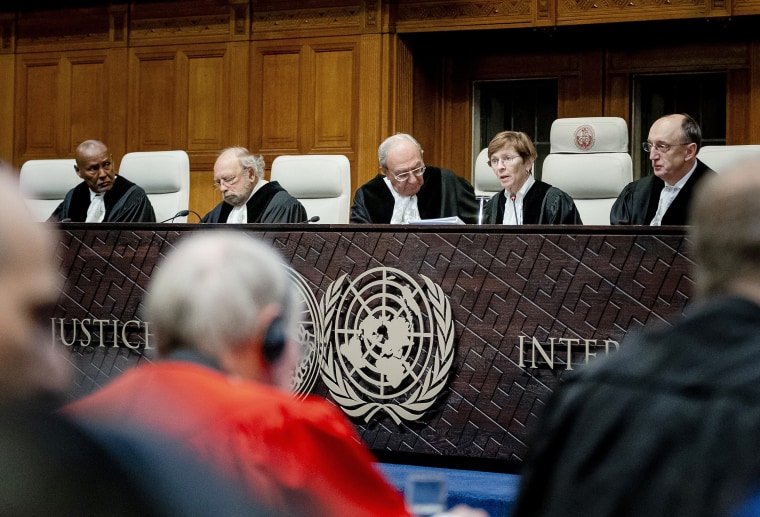
Al-Aqsa Martyrs Hospital will imminently shut down due to a lack of fuel, Palestinian officials say
The Al-Aqsa Martyrs Hospital will imminently shut down due to a lack of fuel, according to a statement from the Palestinian Territories media office.
“Al-Aqsa Martyrs Hospital is about to stop the health service due to running out of fuel, and we fear the death of patients and children in the intensive care and nursery departments,” the statement read.
The office said it holds “all competent and relevant authorities fully responsible” for the deaths of patients, including children.
“We call on all countries of the free world to stop the genocidal war waged by the occupation army against our Palestinian people, as well as to intervene immediately to supply all hospitals with fuel, and to rehabilitate and restore them before it is too late,” the statment said.
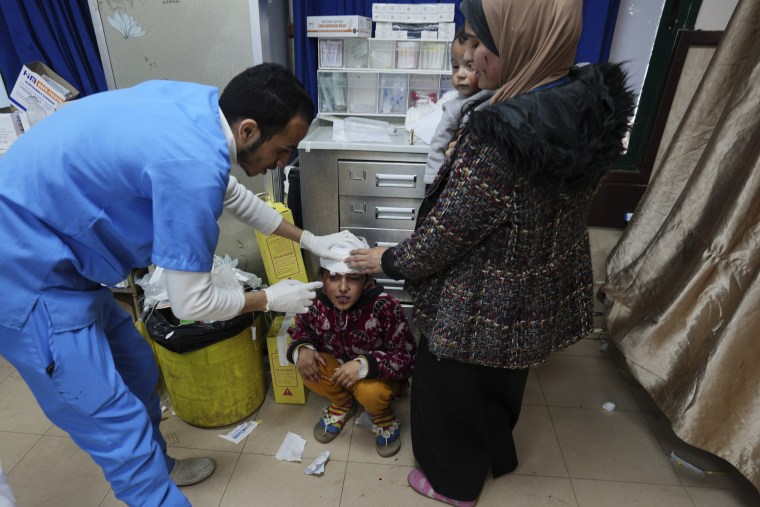
Demonstrators outside The Hague
Demonstrators in support of both Israel and the Palestinians protest outside the International Court of Justice in The Hague, Netherlands during proceedings today.
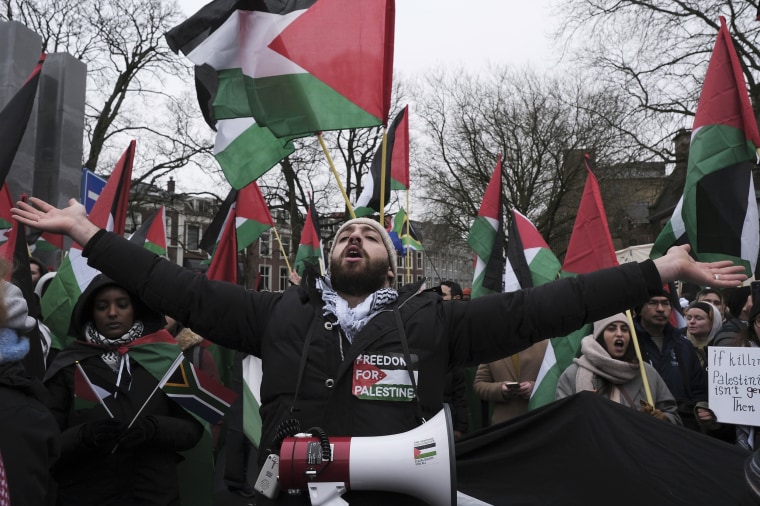
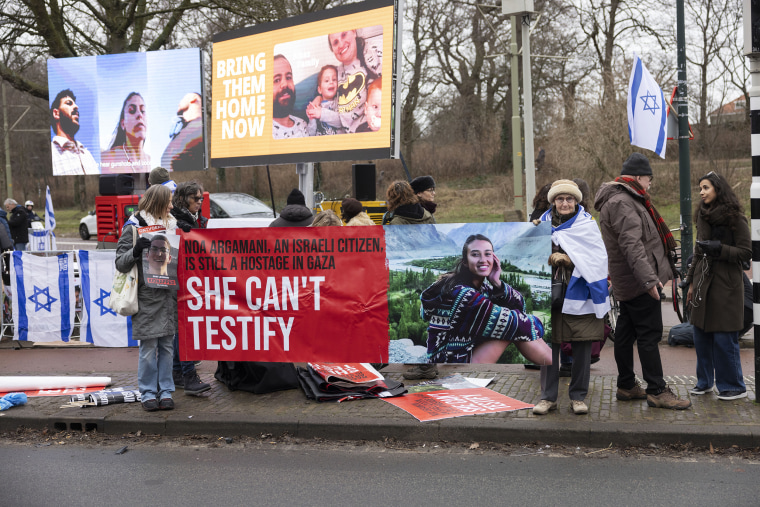
U.S. will ‘take actions to hold Iran accountable,’ State Department spokesman says
The U.S. “will not” and does “not want” to escalate conflict in the Middle East, but “we will take actions to hold Iran accountable,” State Department Spokesman Matthew Miller told NBC News today.
“We do not want to escalate this conflict and we will not escalate this conflict,” Miller told Andrea Mitchell on MSNBC. “But all that said, there are important interests at stake for the United States, there are important interests at stake for the entire world, and we will continue to take action to uphold those principles if and when it’s necessary to do so.”
“We continue to see Iran both attacking the United States, attacking our allies, attacking our partners in the region. And it’s why we have made clear that we will take actions to hold Iran accountable,” he continued.
When pressed on the number of civilian casualties, Miller said, “I know that the assessments are ongoing. There were a number of significant strikes that we believe had a positive effect, but as to the actual assessments.”
He would not go further, saying, “I will leave that to my colleagues at the Pentagon to know anything about collateral damage about civilian casualties.”
When asked about the latest efforts to release the hostages, Miller said Secretary of State Antony Blinken was able to secure agreements with Arab partners and Turkey to have conversations about hostage negotiations.
On the news that Israel made a deal with Qatar to get medicine to hostages in Gaza, he said, “Obviously any progress on that, including the delivery of medicine to hostages, is something that the United States would greatly support.”
Medicine from the World Bank has begun arriving in Gaza, Palestinian health official says
Medicine from the World Bank has begun arriving in Gaza, according to Mai Al-Kaila, Health Minister of the Palestinian territories.
The medicine shipment, which UNICEF will bring into the Gaza strip via Egypt, is worth $2 million, Al-Kaila said in a statement.
The shipment includes vaccines for children, polio vaccines and other medications that the Palestinian Ministry of Health purchased with UNICEF’s help.
White House ‘not looking for conflict with Iran’ after U.S. and U.K. strikes on Houthis
National Security Council spokesman John Kirby joined Ana Cabrera to walk through what led to yesterday’s strike on the Houthis in Yemen and how it could potentially cause more tension with Iran in the Middle East region.
International Rescue Committee ‘deeply concerned’ about humanitarian affects of military escalation in Yemen
The International Rescue Committee is “deeply concerned” about humanitarian impacts of the military escalation in Yemen and the Red Sea.
“The military escalation in Yemen and the Red Sea poses a threat to people in Yemen and the stability of the wider region,” said Jared Rowell, the IRC’s Yemen country director. “Yemenis across the country have woken up fearing a return to conflict. Nine years of war have taken an immense toll, leaving more than 18 million people — over half the population — in urgent need of assistance.”
The U.S.- and U.K.-led airstrikes on Yemen have affected the delivery of aid into the country, resulting in delays of shipments and the rising cost of food and fuel, Rowell said.
“The US/UK strikes today underscore the risk of a wider regional and international confrontation that could further undermine the fragile peace process and regional security,” Rowell said. “All diplomatic channels must be used to de-escalate the crisis, protect civilian lives, and ensure the Red Sea remains open as a safe shipping lane.”
Rowell also called for an immediate cease-fire in Gaza “to prevent the spread of violence.”
Israel strikes deal with Hamas to provide medicine for hostages in Gaza
A deal was made to allow in medicine for Israeli hostages in Gaza, according to a statement from the Israeli prime minister’s office.
The deal was struck with the help of Qatari officials and the medicine will be given to the hostages “in the next few days,” it said.
“Under the guidance of Prime Minister Benjamin Netanyahu, the head of the Mossad, Dedi Barnea, led a move in front of Qatar that would allow the entry of medicine to the hostages held by the terrorist organization Hamas in Gaza,” the statement said. “This, as part of Israel’s humanitarian aid system for the Strip. The medication will be given in the next few days.”
U.S. sanctions 2 companies for financing Houthis and Iran’s Quds Force
The U.S. Treasury Department announced today it is sanctioning two companies in Hong Kong and the United Arab Emirates for financing Houthis and Iran’s Quds Force by shipping Iranian commodities.
“The United States continues to take action against the illicit Iranian financial networks that fund the Houthis and facilitate their attacks,” Undersecretary Brian E. Nelson said in a release. “Together with our allies and partners, we will take all available measures to stop the destabilizing activities of the Houthis and their threats to global commerce.”
The revenue from the commodity sales supports the Houthi attacks on international shipping in the Red Sea and the Gulf of Aden, according to the Treasury Department.
The sanctions come a day after the U.S. and Britain launched strikes against Houthi rebels in Yemen in retaliation for the attacks on shipping vessels.
American and British attack on Yemen ‘a disproportionate use of force,’ Erdogan says
The attacks by the U.S. and Britain on Yemen are a “disproportionate use of force,” Turkish President Tayyip Recep Erdoğan was quoted as saying by the country’s directorate of communications today.
“Israel also resorts to this disproportionate use of force in Palestine,” he said.
Erdoğan said that he used to regard Israeli President Isaac Herzog “as much more friendly,” but that Herzog had recently imitated Prime Minister Benjamin Netanyahu “and begun making very different statements.”
Erdoğan added that documents provided by Turkey were being used at the genocide case at the International Court of Justice in The Hague.
“With the documents we have delivered, which are mostly visual documents, Israel will be condemned,” he said.
Children sell food and drinks on the streets of Rafah to help support their families
NBC News spoke with three young Palestinians who were selling food and drinks on the streets of Rafah in southern Gaza in order to raise money for their displaced families.
“If I made a little money, I would buy food for my siblings,” one youngster, named Mohamed, said.
Israeli access denials ‘paralyze’ Gaza aid deliveries, U.N. says
Less than a quarter of this month’s planned aid deliveries to northern Gaza were able to proceed, the United Nations Office for the Coordination of Humanitarian Affairs said in a report yesterday.
Only five out of the planned 24 missions could proceed, it said, adding that only two were completed entirely. Most were delayed and canceled because of delays at Israeli checkpoints, the report said.
“These denials and severe access constraints paralyze the ability of humanitarian partners to respond meaningfully, consistently and at-scale,” it added.
Who are the rebels costing billions in trade and threatening to escalate conflict across the Middle East?
DOHA, Qatar — Battle-hardened and backed by Iran, Yemen’s Houthi rebels have launched a series of attacks on Israel, as well as on commercial ships in the Red Sea, stoking fears of a wider conflict in the region already reeling from the war in Gaza and on tenterhooks about escalating violence between Israel and Hezbollah fighters in Lebanon.
After declaring support last year for Hamas in its fight against Israel, they have bombarded ships in the Red Sea. They fired 21 drones and missiles Tuesday, their biggest attack yet, according to British officials, ignoring a United Nations resolution and ultimatums by the U.S. and its Western allies to stop.
Overnight, U.S. and British ships struck targets in Houthi-controlled parts of Yemen with fighter jets and Tomahawk missiles, two U.S. officials said.
The military action against the Houthis’ capability inside Yemen is a major escalation by the U.S., supported by Britain, after Secretary of State Antony Blinken warned that further attacks could prompt a Western military response.
Read the full story here.
‘We have very little information,’ say parents of American kidnapped by Hamas
Hersh Goldberg-Polin lost part of his arm during the Hamas attack on Oct. 7 when he was kidnapped by militants. He has remained in captivity after almost 100 days.
His parents, Jon Polin and Rachel Goldberg, spoke to NBC News’ Joe Fryer and Savannah Sellers about their ordeal and hopes of being reunited with their son.
Israel has shown ‘recurring failures’ to uphold international law, U.N. says
Israel has repeatedly failed to uphold international humanitarian law since it launched its offensive in Gaza in response to Hamas’ Oct. 7 attacks, a spokesperson for the United Nation High Commissioner for Human Rights said today.
“We’ve repeatedly highlighted Israel’s recurring failures to uphold the fundamental principles of international humanitarian law: distinction, proportionality and precautions in carrying out attacks,” Elizabeth Throssell said in a statement.
She added that High Commissioner for Human Rights Volker Türk “has stressed that breaches of these obligations risk exposure to liability for war crimes, and has also warned of the risks of other atrocity crimes.”
Strike on a house kills 9 in central Gaza, Red Crescent says
At least nine people were killed today after a strike targeted a house in the city of Deir al-Balah in central Gaza, the Palestine Red Crescent Society said in a post on X.
Another 13 people were left injured, it added.
NBC News could independently verify the claim.
Israelis march for Oct. 7 kidnap victims outside ICJ court
While the battle at the International Court of Justice focuses on Palestinians being killed in Gaza, Israeli officials are trying to make sure that hostages kidnapped during Hamas’ Oct. 7 attack remain part of the narrative.
Outside the ICJ courtroom in The Hague, protesters have been marching with banners demanding “Bring them home!” alongside images of those taken.
Around 240 people were abducted during the assault last year, 136 of whom are believed to still be in captivity, including two children under the age of 5.
The Israeli government has been heavily criticized by many of the families, who accuse it of focusing too much on bombing Gaza rather than diplomatic efforts. Nevertheless Israeli officials have been posting regularly on social media during the ICJ hearings, promoting the marches outside the courtroom.
The Houthis are ‘not an adversary to be underestimated,’ analyst says
TEL AVIV — The Houthis are unlikely to be deterred by the U.S. and U.K. strikes carried out overnight, and the Iran-backed militant group in Yemen should not be “underestimated,” an analyst has warned.
The decision to launch the strikes on Houthi military targets following weeks of attacks by the rebel group in the Red Sea will not have been taken lightly, Elisabeth Kendall, head of Girton College at the University of Cambridge and an expert on Yemen and the broader Middle East, told NBC News in a phone interview.
“Someone, somewhere will have weighed up that question: Is it worth it? The cost of doing nothing, was probably quite high,” she said. But, she noted, the rebel group is no stranger to strikes, being embroiled in an almost decadelong war against a Saudi-led coalition. And it will likely have been “preparing for potential retaliation” to its attacks in the Red Sea and “will have taken measures to ensure that they still can continue,” she said.
Kendall said concerns that the strikes threaten an expansion of the conflict in the Middle East are not misplaced and that the Houthis, who control much of Yemen and have said their actions in the Red Sea are in support of Hamas and Palestinian civilians in Gaza, are “not an adversary to be underestimated.”
Not only do the Houthis “feel genuine outrage at what’s happening” in Gaza, but they also “have high confidence in their abilities, having kept some of the … best invested militaries at bay for nine years, the U.A.E. and Saudi Arabia. And they believe they’ve got God on their side,” Kendall said. “So, the most likely scenario now is that they will try to exact revenge. They will retaliate. They won’t stop. They’ll continue.”
Israel finishes its initial defense, judges retire to deliberate
Israel has finished its oral arguments defending itself against accusations of genocide at the International Court of Justice brought by South Africa.
“In living memory of the atrocities that gave birth to the term genocide, in the aftermath of which the state of Israel was founded, we are witnessing a concerted and cynical effort to pervert the meaning of the term genocide itself,” Israeli Deputy Attorney General Gilad Noam said.
“Israel remains committed to international law,” he said. “When the cannons roar in Gaza, the law is not silent. This has been the case since Israel’s establishment in 1948, the same year the Genocide Convention was adopted: Israel’s commitment to the rule of law has remained steadfast throughout our history.”
The ICJ is not currently ruling whether Israel is guilty of genocide, only whether the Genocide Convention — the relevant piece of international law — applies in this case. It has also been asked by South Africa to order an interim cease-fire while this case plays out.
The court’s president, Judge Joan E. Donoghue, said the bench would come to a decision as soon as possible and let the parties know the date of this ruling in due course.
How South Africa tried to neuter a key Israeli argument
Israel’s defense was launched with a detailed and harrowing description of Hamas’ attack on Israel on Oct. 7.
“We do so because it is impossible to understand the armed conflict in Gaza without appreciating the nature of the threat that Israel is facing, and the brutality and lawlessness” of Hamas, Tal Becker, legal adviser to Israel’s Foreign Ministry, told the court.
South Africa’s legal team attempted to pre-empt this line of defense yesterday, arguing that — no matter how barbarous the war crimes — it does not absolve a retaliation that itself allegedly violates international law.
South African Justice Minister Ronald Lamola said yesterday that “no armed attack on a state territory, no matter how serious, even an attack involving atrocity crimes, can provide any justification for, or defense to, breaches” of the Genocide Convention.
Today, Israeli lawyer Becker responded to this. “None of these atrocities absolve Israel of its obligations under the law,” he said. “But they do enable the court to appreciate core aspects of the present proceedings which the applicant has obscured from view.”
Strikes send a ‘very clear message’ to Houthis and Iran, British foreign minister says
LONDON — Overnight air raids on Houthi positions in Yemen send a “very clear message” to both the militant group “but also to Iran as well,” British Foreign Secretary David Cameron told NBC News today.
Insisting that the U.S. and the U.K. had no choice but to target the rebel group’s positions after repeated strikes on Red Sea shipping lanes, he said, “Warning after warning has been given and yet the attacks continued.”
Cameron added that a U.N. Security Council resolution calling for an end to Red Sea attacks had been ignored and that he had spoken to Iranian Foreign Minister Hossein Amirabdollahian about them.
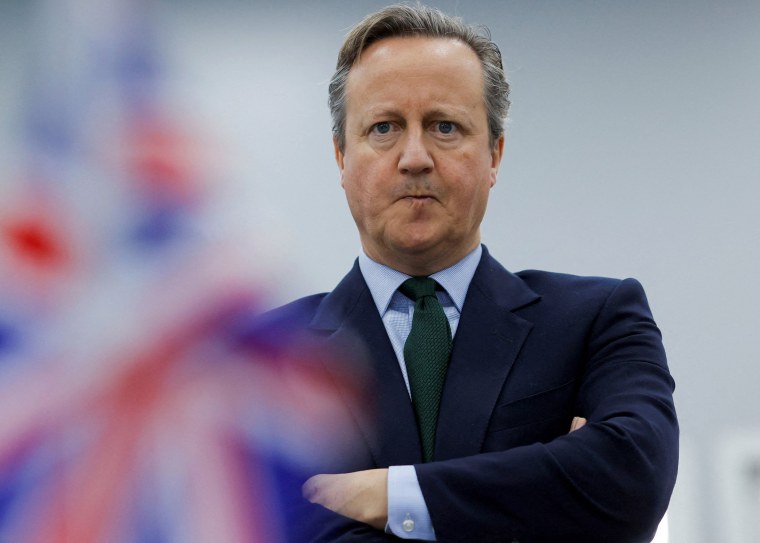
Asked whether further strikes from the U.S. and U.K. were planned, Cameron said, “We will do what is necessary.”
He added that the strikes were “separate” from Israel’s war with Gaza, despite Houthi claims that the Red Sea attacks were to support people in the enclave.
“What we were doing, warnings, was not working,” Cameron said. “The number of attacks were increasing, the severity of the attacks was increasing. This is escalation by the Houthis.”
Iran backed the militant group with weapons and support in its long-running war with a Saudi Arabian-led coalition inside Yemen. Riyadh, which was on the verge of a peace deal, today expressed “grave concern.” While Oman asked why the Houthis were being targeted while Israel was “not being held to account.”
Russia and China were quick to question the action. Russia, which has been criticized for its war in Ukraine, denounced the strikes while Chinese Foreign Ministry spokeswoman Mao Ning called on all countries and parties to exercise restraint.
Iran and Hezbollah denounce U.S. strikes in Yemen
Iran and the Tehran-backed militant group Hezbollah today denounced the U.S. and British strikes against Houthi targets in Yemen, with Iran calling the attacks a violation of Yemen’s sovereignty.
The attacks will have no result other than fueling instability in the region, Iranian Foreign Affairs Ministry spokesman Nasser Kanaani said today in a post on X.
“America is a full partner in the tragedies and massacres committed by the zionist enemy in Gaza and in the region,” Hezbollah said in a statement today, adding the attacks will only strengthen the Yemenis’ resolve to “continue the path in supporting the Palestinian people.”
The Yemeni rebels are also backed by Iran and have been increasingly drawn into the conflict since the Oct. 7 Hamas attack, targeting ships moving through the Red Sea.
Why Israel says even the suggestion of genocide isn’t ‘plausible’
At this stage of the ICJ case, South Africa does not have to prove that Israel breached the Genocide Convention, only that this branch of international law is relevant and applicable in this instance.
Israeli lawyer Galit Raguan has been arguing that it is not, because Israel has gone to great lengths to try to prevent civilian casualties, while Hamas has been deliberately putting them in harm’s way.
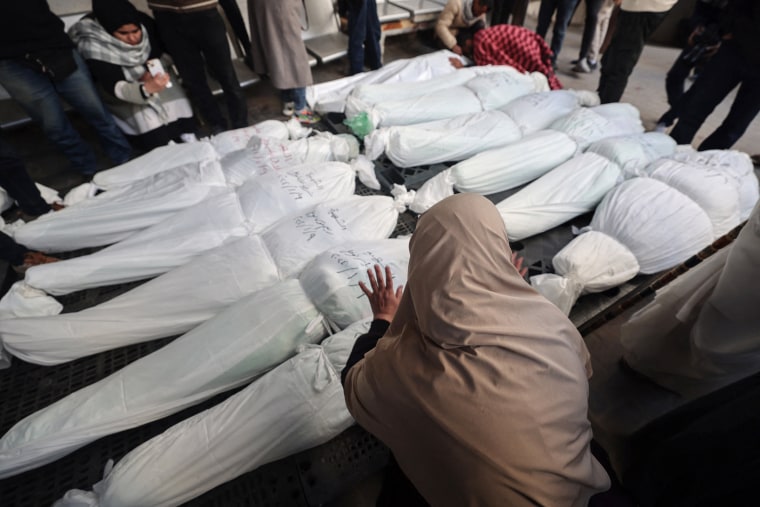
“Under the circumstances, far from being the only inference that could reasonably be drawn from Israel’s pattern of conduct, intent to commit genocide is not even a plausible inference,” she said, finishing her oral arguments to the court. “Israel’s efforts to mitigate the ravages of the war on civilians are the very opposite of intent to destroy them.”
Oil prices up after U.S., Britain strike Houthi targets
Oil prices rose more than 2.5% this morning after the U.S. and Britain carried out air and sea strikes on Houthi military targets in Yemen in response to attacks by the Iran-backed group on shipping in the Red Sea.
The attack added to market concerns about the potential impact a broader conflict in the Middle East would have on oil supplies from the region, especially those moving through the critical Strait of Hormuz.
‘Tragic’ civilian deaths do not equal genocide — Israel’s lawyer
The hearing has now resumed with Galit Raguan, a member of Israel’s legal team, arguing that Hamas — not Israel — is responsible for civilian casualties in Gaza because the militant organization uses people as “shields” in the densely populated enclave.
“Urban warfare will always result in tragic deaths, harm and damage,” Raguan said. “But in Gaza, these undesired outcomes are exacerbated because they are the desired outcome of Hamas.”
“Yes, damage and harm have occurred as a result of hostilities — sometimes by IDF fire, sometimes by Hamas, but always as a direct result of Hamas and its methods of warfare,” she said. “In every single hospital that the IDF has searched in Gaza, it has found evidence of Hamas military use.”
‘There is no genocide’: Israel top lawyer says as he ends arguments
“The truth is, that if there has been any genocidal activity in this situation it was the events of Oct. 7,” Malcolm Shaw, the head of Israel’s legal team, said in his closing statements to the ICJ this morning.
“There is no genocidal intent here; there is no genocide,” he said. “But South Africa tells us only half the story.”
Shaw reiterated the main themes of Israel’s defense: Israel has targeted Hamas, not the Palestinian people, whom it has tried to protect; South Africa has ignored Hamas’ crimes on Oct. 7; and Israeli officials’ statements have not displayed genocidal intent, but rather have been cherry-picked by South Africa in an attempt to portray them as doing so.
The court has now taken a 10-minute “coffee break” and will resume after that.
Israel’s lawyer slams South African argument as ‘misleading at best’
One of the subplots playing out alongside the ICJ case are the repeated comments by members of Prime Minister Benjamin Netanyahu’s coalition government suggesting that Palestinians could be relocated outside of Gaza to make way for Israeli settlers.
Netanyahu himself has denied this is official government policy. And Israel’s lawyer, Malcolm Shaw, has just addressed this in court.
“Choosing random quotes, which not in conformity with government policy, is misleading at best,” he said. Shaw focused on comments by one government minister who is “completely outside policy decision-making stages of war,” he added. “His statement was immediately repudiated by the prime minister and ministers.”
China calls for restraint over Yemen strikes; Russia requests urgent U.N. Security Council meeting
HONG KONG — China has called for “calm and restraint” following the U.S.-led strikes on Houthi targets in Yemen, with Foreign Ministry spokesperson Mao Ning saying today that the “waters of the Red Sea are an important corridor for international trade in goods and energy.”
She said China was ready to “push for a cooling down of the situation so as to jointly maintain the safety of international shipping lanes.”
Meanwhile, Russia has requested the U.N. Security Council to hold an urgent meeting over the strikes, its U.N. mission said in a post on X.
Strikes destroy homes in Rafah, southern Gaza
Palestinians climb over the remains of a house following an Israeli bombardment in Rafah in southern Gaza today.
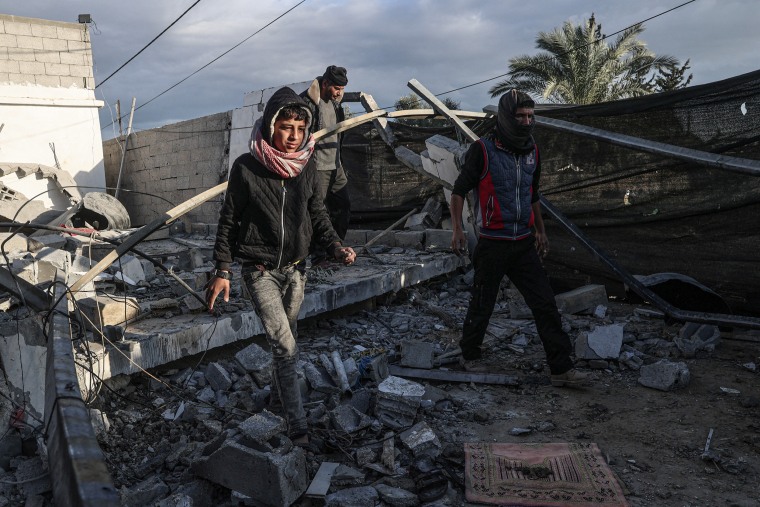
Genocidal arguments based on ‘random assertions,’ Israel says
Malcolm Shaw, the veteran head of Israel’s legal team, is now focusing on South Africa’s need to prove that Israel has acted with genocidal intent — an extremely high bar in international law.
“In this case, there is little beyond random assertions to demonstrate that Israel has or has tried to destroy, in whole or in part, the Palestinian people,” Shaw said. He said that the Israeli military has restricted its attacks to “military personnel or objectives in accordance with international humanitarian law in a proportionate manner,” while “mitigating civilian harm, such as by forewarning civilians of impending action by the unprecedented and extensive use of telephone calls, leaflets and so forth.”
He also said that IDF soldiers are bound by an operational directive that states “attacks will be solely directed toward military targets while adhering to the principles of distinction, proportionality and the obligation taking precautions in attacks in order to reduce collateral damage.”
More than 23,000 people have been killed in Gaza during Israel’s war, according to local officials, whose figures American and U.N. officials say are accurate. Some 70% of these casualties are women and children, the Health Ministry in Hamas-administered Gaza says. Israel says Hamas is responsible for these deaths.
A ‘blindfold,’ not a ‘lens’: Israel wraps opening arguments
Becker has wrapped his opening arguments to the ICJ by accusing South Africa of “not offering the court a lens — it is offering a blindfold.” He said the genocide allegations downplayed and almost ignored Hamas’ own genocidal attacks against Israel, and disavowed Israel’s right to defend itself while following international law.
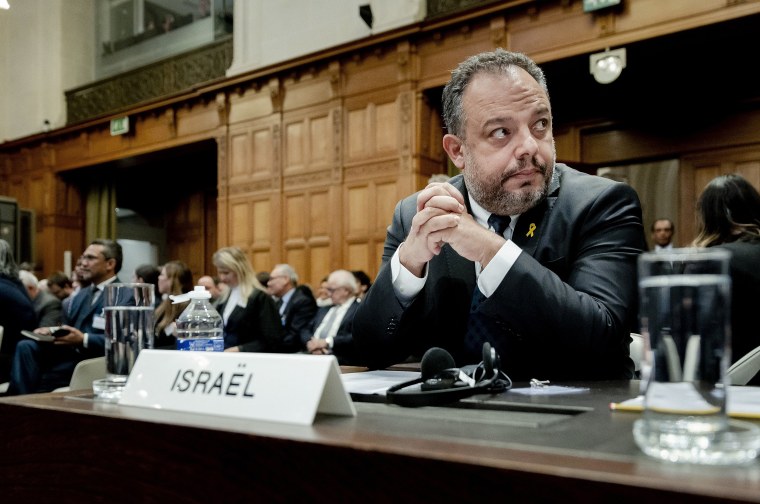
“Israel is fighting Hamas terrorists, not the civilian population,” he said. “Israel aims to ensure that Gaza can never again be used as a launchpad for terrorism. It wants to create a better future for Israelis and Palestinians are like we both can live in peace, thrive and prosper. And where the Palestinian people have all the power to govern themselves, but not the capacity to threaten Israel.”
He added that “if there is a threat to that vision, if there is a humanitarian threat to the Palestinian civilians of Gaza, it stems primarily from the fact that they have lived under the control of a genocidal terrorist organization” — Hamas.
The head of Israel’s legal team, British jurist Malcolm Shaw, is now giving oral arguments to the court.
South Africa’s allegations are ‘a libel,’ Israel says
Israel’s legal team has called South Africa’s genocide case at the ICJ “a libel.”
Giving evidence to the court, its lawyer Tal Becker invoked the history of the Holocaust, the mass murder of Jews and other groups during World War II that inspired the conception of the Genocide Convention in 1948.
“The Genocide Convention was a solemn promise made to the Jewish people, and to all peoples, of ‘never again,’” Becker said, adding that South Africa was asking “the court to betray that promise.” He warned that “if term genocide can be so diminished” in this way, “it suggests the convention has become an aggressor’s charter.”
South Africa’s allegations, Becker added, “should be dismissed for what they are: A libel designed to deny Israel the right to defend itself, according to the law, from the unprecedented terrorist onslaught it continues to face.”
Houthis vow retaliation, say at least 5 killed in U.S.-led strikes
The U.S. and U.K. strikes against Houthi targets in Yemen killed at least five militants and injured six others, the Iran-backed rebels said today, adding the attacks will not go “unanswered and unpunished.”
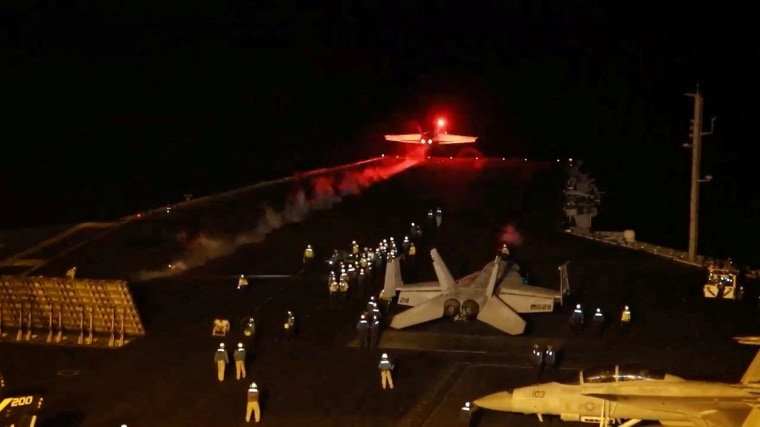
“The Yemeni armed forces will not hesitate to target sources of threat and all hostile targets on land and at sea in defense of Yemen, its sovereignty and independence,” the group said in a statement on Telegram.
Houthis refer to themselves as the Yemeni armed forces.
It said the strikes had targeted the capital, Sana’a, and four other areas in a total of 73 raids.
Court order for cease-fire would be ‘astonishing,’ Israel says
Israel’s legal team has described as “astonishing” South Africa’s request for the ICJ to order an immediate cease-fire in Gaza.
“This amounts to an attempt to deny Israel its ability to meet its obligations to the defense of its citizens, and to the hostages,” according to the legal adviser to Israel’s Foreign Ministry, Tal Becker. South Africa “makes almost no mention of the ongoing humanitarian suffering of Israel citizens at the hands of Hamas, and treats the hostages still held in captivity as barely an afterthought.”
He said a cease-fire would allow “Hamas not just get away with its murder, literally, but render Israel defenseless as commerce continues to commit.”
Israel’s defense begins, accusing South Africa of parroting Hamas
Tal Becker, legal adviser to Israel’s Foreign Ministry, has launched oral arguments at the ICJ, alleging that South Africa’s accusations “sounded barely distinguishable from Hamas’ own rejectionist rhetoric.”
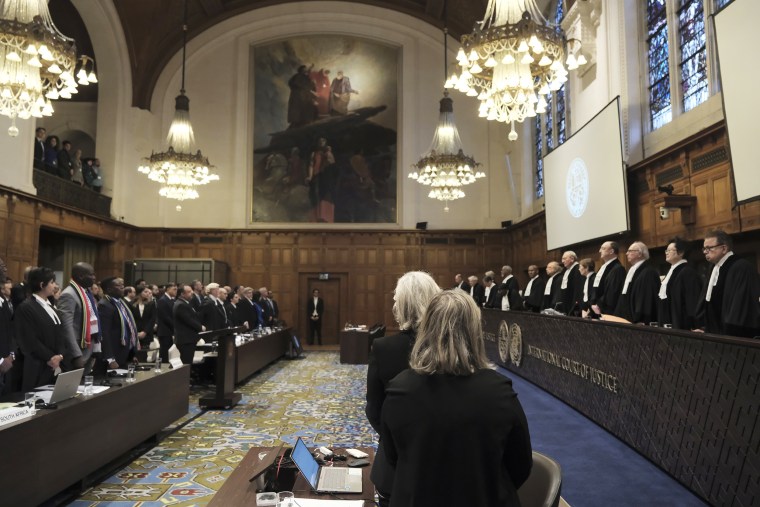
In South Africa’s telling, “both Hamas’ responsibility for the situation in Gaza, and the very humanity of its Israeli victims, are removed from view in the attempt to weaponize the term genocide against Israel,” he said.Becker is also describing graphic details of Hamas’ Oct. 7 attack, which he called “the largest calculated mass murder of Jews in a single day since the Holocaust.” He said “the events of that day have all been ignored in” South Africa’s legal submissions to the court.
In its documents and oral arguments, South Africa said it “unequivocally condemns all violations of international law by all parties, including the direct targeting of Israeli civilians and other nationals and hostage-taking by Hamas and other Palestinian armed groups.”
Crowds gather in The Hague on second day of hearing
Protesters carry Palestinian flags outside the International Court of Justice prior to a hearing in The Hague, Netherlands, this morning.
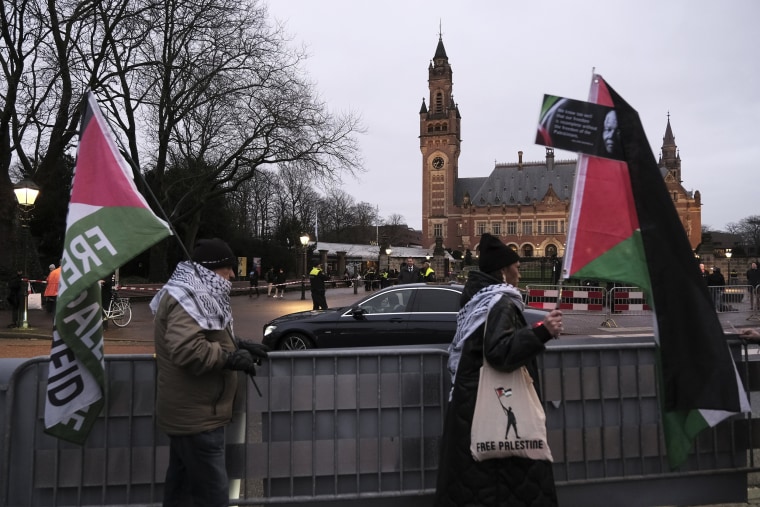
Israel set to present its defense in Gaza genocide case
After South Africa’s lawyers spent yesterday morning setting out their case that Israel is guilty of genocide against Palestinians in Gaza, today it’s Israel’s turn to defend itself.
The battle at the International Court of Justice, the United Nations’ top court in the Dutch city of The Hague, is a rare one for Israel. It typically derides the U.N. and other international bodies as being biased against it — but this time it is mounting a full-throated defense.
Like yesterday, oral arguments will start at 10 a.m. local time (4 a.m. ET). Israel’s defense is being led by Malcolm Shaw, a British lawyer who has represented countries at the ICJ in the past.
Israeli officials have already offered a hint of their position, accusing South Africa yesterday of being the “the legal arm” of Hamas, and calling the case “one of the greatest shows of hypocrisy in history.” South Africa has “unequivocally condemned” Hamas for its Oct. 7 attacks and its case has been focused on Palestinian civilians.
Top Houthi negotiator blames Israel for wider conflicts in the Middle East
The Houthis are a powerful force inside Yemen, but they recently emerged on the world stage when they began to blockade the Red Sea in retaliation for Israel’s blockade of Gaza.












